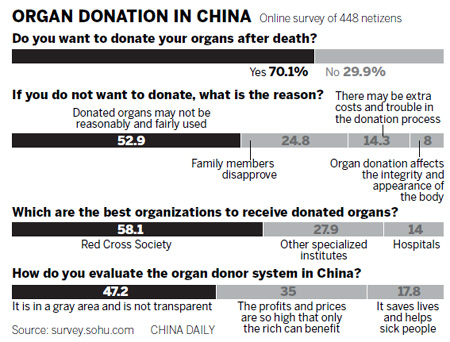Society
Drivers get organ donor opportunity
By Shan Juan (China Daily)
Updated: 2011-04-26 08:02
 |
Large Medium Small |
BEIJING - While applying to get driver's licenses on the mainland, members of the public can agree to give their organs away after they die, said Huang Jiefu, the vice-minister of health.
Under the new initiative, applicants will be asked to indicate if they are willing to donate their organs should they die, and, if so, which organs they would like to donate.
"This will lead to more voluntary organ donations among the public, will to some extent ease the severe shortage in donated organs, and, finally, will save more patients," said Qiu Renzong, a bioethics researcher at the Chinese Academy of Social Sciences.

He said the health administration, traffic administration and other interested parties must work together more closely to ensure his predictions come true.
But knowledge of the plan to encourage more people to agree to give away organs after death is not widespread. A press officer with the Ministry of Public Security's traffic management bureau, who didn't want to give her full name, told China Daily on Monday that she and her colleagues had not heard of it.
"The driver's license applications are now in strict accordance with current traffic laws," she said. "And, so far, we haven't heard of any changes to those laws."
Estimates hold that 1.5 million Chinese patients need transplants each year but only 10,000 of them can obtain a suitable organ.
Meanwhile, about 100,000 people die in road accidents on the mainland every year. A large number of them, as Huang noted, could have become organ donors.
In many parts of the world, people are given paperwork when they apply for driver's licenses which they can fill out to agree to give their organs away after their deaths.
Eighty percent of Australian drivers use such opportunities to agree to donate their organs, as do 45 percent of British drivers.
"I am sure the Chinese people are very kind-hearted and will always be willing to help others in need," Huang said.
He said only individual persons should be able to decide if they want to give organs to others and that organ donation "is just a matter of personal choice rather than of morality".
To encourage benevolence, incentives should be given to those who agree to donate organs. He said donors' families should be exempted from having to pay the medical costs and funeral expenses of donors, and should receive tax rebates, medical insurance or tuition waivers.
Shi Bingyi, a veteran organ transplant expert at the No 309 Hospital of the People's Liberation Army in Beijing, welcomed the plan.
At the hospital where Shi works, patients must often wait from two to three years to secure kidneys that are suitable for their bodies.
"The situation would be improved once the new initiative begins to run smoothly," he said. "But it will take time."
Public opinion is divided about the proposal.
A Beijing resident, Xu Liyu, said he is willing to donate organs after his death in return for no compensation, if doing so will help save lives.
Not everyone is of the same mind. Shao Pei, a Beijing-based IT worker, said: "I won't donate till I am sure that the use is transparent and fair."
| 分享按鈕 |